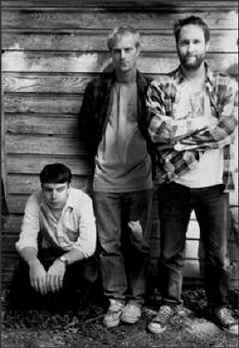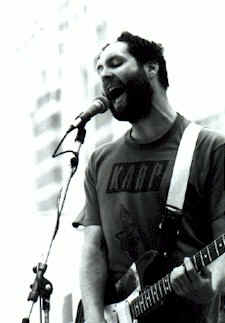So they signed to a "major label." So what?
Built to Spill's Doug Martsch says the only thing different is the paycheck.
|
 |
|
Built to Spill: Success Hasn't Spoiled Them Yet
by Tim McMahan
|
I pretty much
knew what I was in for before the interview. I had done the research and read everything
I could about Built to Spill and the band's lead vocalist/guitarist/mastermind Doug
Martsch. The stories were mostly long-winded descriptions of the band's music, history,
the Pacific Northwest music scene, just about anything the writer could think of. There
weren't many quotes by Martsch.
I told him the word on the street was that he was a tough interview. "Really?
That's weird," he replied in a clipped, soprano voice that sounds like one of the
sock puppets on MTV's Sifl & Olly show. "I always kick myself in the ass for
being too open and honest. I always have these ideas of ways to fuck with people. But then
I get on the phone and like whomever I'm talking to and tell them whatever they want to
know. I get into these terrible discussions about the nature of music -- things I
shouldn't be talking about."
It's something that he's certainly used to by now, especially with the dozens of
interviews he's done in support of the band's latest masterpiece, Keep It Like a Secret.
It's their second release on Warner Bros., following the well-received, anthem-ridden '95
opus, Perfect From Now On. Prior to that, Martsch was strictly an indie-label guy,
changing Built to Spill's line-up from album to album, doing what he could to mix things
up. Not anymore. Since the Warner Bros. deal he's held on to drummer Scott Plauf and
bassist Brett Nelson. And now finds himself -- more often than he'd like -- doing
interviews by phone from his home in Boise, Idaho.
He said that since the Warner's deal he's had to "do a lot more extra stuff; more
interviews like this, more in-store appearances and visiting radio stations."
And though crowds have continued to grow, "I don't know how much that has to do
with being on a major label. I'm sure a little bit, but any time you go out on tour, you
do a little bit better. More and more people learn about you and you're going to sell more
records."
Martsch forgets to mention the fact that Keep It Like a Secret also is a more
streamlined, more traditional sounding album that, with the help of long-time producer
Phil Ek, showcases the band's enormous talents. Built to Spill has a huge sound for a
3-piece outfit, thanks to Martsch's souring guitar and equally high-flying, high-register
vocals that fall into the same general territory as Brian Wilson, Graham Nash or even a
less shrill (and tolerable) Jon Anderson from Yes. Martsch chuckles at the Yes comparison.
"We get compared to all kinds of weird things, nothing's very accurate," he
said. "I think we're at the point now where, if you put out enough records, they quit
comparing you to other people and start comparing people to you. I think Modest Mouse is
at that point now. They don't get compared to us so much anymore. They're a huge influence
on us, along with Caustic Resin." |
 |
"I guess I'm similar to Neil Young in that
we both play with a whammy bar and are kind of over-the-top sounding. Neither of us are
super hotshot guitar players."
|
But what
about Neil Young? The last track on Keep It Like a Secret, "Broken Chairs,"
contains mighty, Crazy Horse-style riffs, slurring guitar solos and Martsch's sweeping
high-end vocals that, if you close your eyes and try hard enough, will remind you of a
certain Transformer Man.
"Actually, now that I think about it, that song totally reminds me of a Neil Young
song," Martsch said. "It sounded more like Neil Young when I first wrote it,
though. The rhythm guitar part that you can barely hear was in a different key and was a
little stronger. I thought the melody was pretty Neil Young-ie, but by the time it was
recorded, it didn't remind me of Neil Young at all."
Martsch said he's been more influenced by Dinosaur Jr.'s J. Mascus, who also was
"pretty Neil Young-ie."
"But I like guitar solos, and I guess I'm similar to Neil Young in that we both
play with a whammy bar and are kind of over-the-top sounding. Neither of us are super
hotshot guitar players. I think he plays beautiful guitar, some of the best guitar out
there, but he's not all that technically proficient."
These days, Martsch says he's being influenced by the classic blues recordings of the
1920s and '30s. "I kind of wanted to listen to good blues for a long time, but didn't
know what was good and where to start."
While mixing the album last summer, he said, everyone from the band's A&R rep to
the recording studio owner began pointing out albums by the likes of Mississippi Fred
McDowell and Robert Johnson before he began checking out recordings from his local library
in Boise. "Then I got the Harry Smith folk anthology," he said, "and that
opened up a lot of things. That was followed by the Yazoo folk/blues samplers, then
someone turned me onto the new blues, like good John Lee Hooker and Lightnin'
Hopkins." |
|
|
Martsch said
he's been inspired by the music and is considering recording another album with the Halo
Benders'- a side project with Calvin Johnson - or perhaps recording solo effort. "I
can't play blues songs because I can't figure out anyone else's stuff at all," he
said, "but I've been writing songs in a Fred McDowell style. His music made immediate
sense to me. I know I wouldn't have liked it 10 years ago. It's really basic, really
subtle. It's not for everyone. When I go on tour, no one wants to hear the blues. When
it's my turn to drive, I turn it on and they put on their Walkmans."
Martsch says he doesn't pay much attention to today's music. Asked about ongoing debate
as to whether rock music is on life support, Martsch says, "It doesn't mean anything
to me at all. I write songs to make records. I don't care what other people are listening
to. People keep saying things like that about guitar rock, but whenever I turn on
alternative radio, it's all guitar music. It's all shitty, but people are listening to it;
people are buying those records."
And people also are buying Built to Spill albums, though not at the pace of Matchbox 20
or N'Sync. It doesn't matter to Martsch.
"I'm totally happy with what's going on and have been from the get go," he
said. "There are times where I wish someone else was paying for our recordings or
that things could go a little bit better, but for the most part, I like where we've been
and where we're going."
Back to 
Printed in The Reader May 6, 1999.
Copyright © 1999 Tim McMahan. All rights reserved. |
"...whenever I turn on alternative radio,
it's all guitar music. It's all shitty, but people are listening to it; people are buying
those records."
|
|

![]() webboard
interviews
webboard
interviews